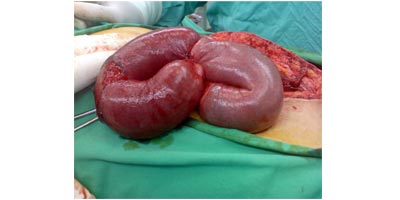
Intestinal obstruction is a blockage that keeps food or liquid from passing through your small intestine or large intestine (colon). Intestinal obstruction may be caused by fibrous bands of tissue in the abdomen (adhesions) which form after surgery, inflamed or infected pouches in your intestine (diverticulitis), hernias and tumors.
Without treatment, the blocked parts of the intestine can die, leading to serious problems. However, with prompt medical care, intestinal obstruction often can be successfully treated.
Symptoms
Common causes of mechanical obstruction, in which something physically blocks the small intestine, include:
Mechanical obstruction is much less common in the colon. Potential causes include:
Paralytic ileus can cause signs and symptoms of intestinal obstruction, but doesn’t involve a physical blockage. In paralytic ileus, muscle or nerve problems disrupt the normal coordinated muscle contractions of the intestines, slowing or stopping the movement of food and fluid through the digestive system.
Paralytic ileus can affect any part of the intestine. Causes can include:
Diseases and conditions that can increase your risk of intestinal obstruction include:
Untreated, intestinal obstruction can cause serious, life-threatening complications, including:
Tests and procedures used to diagnose intestinal obstruction include:
Treatment for intestinal obstruction depends on the cause of your condition, but generally requires hospitalization.
When you arrive at the hospital, the doctors will first work to stabilize you so that you can undergo treatment. This process may include:
If you have mechanical obstruction in which some food and fluid can still get through (partial obstruction), you may not need further treatment after you’ve been stabilized. Your doctor may recommend a special low-fiber diet that is easier for your partially blocked intestine to process. If the obstruction does not clear on its own, you may need surgery to relieve the obstruction.
If nothing is able to pass through your intestine, you’ll usually need surgery to relieve the blockage. The procedure you have will depend on what’s causing the obstruction and which part of your intestine is affected. Surgery typically involves removing the obstruction, as well as any section of your intestine that has died or is damaged.
Alternatively, your doctor may recommend treating the obstruction with a self-expanding metal stent. The wire mesh tube is inserted into your colon via an endoscope passed through your mouth or colon. It forces open the colon so the obstruction can clear. Stents are generally used to treat people with colon cancer or to provide temporary relief for people who are at high risk of emergency surgery. You may still need surgery, once your condition is stable.
To book your appointment with a gastro surgeon, please reach out to us on +91 8160650099

